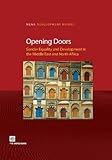Opening doors : [electronic resource] gender equality and development in MENA / The World Bank.
Contributor(s): World Bank
Material type: TextSeries: MENA development reportPublisher: Washington, DC : World Bank, 2013Description: pages cmContent type: text Media type: unmediated Carrier type: volumeISBN: 9780821397633 (alk. paper)Subject(s): Sex discrimination against women -- Africa, North | Sex discrimination against women -- Middle East | Women -- Legal status, laws, etc. -- Africa, North | Women -- Legal status, laws, etc. -- Middle East | Women's rights -- Africa, North | Women's rights -- Middle EastAdditional physical formats: Print Version:DDC classification: 305.420956 LOC classification: HQ1236.5.M653 | O64 2013Online resources: home
TextSeries: MENA development reportPublisher: Washington, DC : World Bank, 2013Description: pages cmContent type: text Media type: unmediated Carrier type: volumeISBN: 9780821397633 (alk. paper)Subject(s): Sex discrimination against women -- Africa, North | Sex discrimination against women -- Middle East | Women -- Legal status, laws, etc. -- Africa, North | Women -- Legal status, laws, etc. -- Middle East | Women's rights -- Africa, North | Women's rights -- Middle EastAdditional physical formats: Print Version:DDC classification: 305.420956 LOC classification: HQ1236.5.M653 | O64 2013Online resources: home Includes bibliographical references and index.
Acknowledgements -- Foreword -- Acronyms and abbreviations -- Executive summary -- Gender equality in MENA : the facts and the puzzle -- Impressive achievements in human development -- Little discrimination between girls and boys within the household -- Of the lowest rates of excess female mortality in the world -- Rapid declines in maternal mortality -- More girls in school than in much of the world -- Virtually no gender gaps in enrolment, and reverse gender gaps in university, and math performance -- MENA's performance in human development is largely explained by economic development and wealth -- Some challenges remain -- The puzzle in MENA : why do women participate in such few numbers outside the home? -- Women in the workforce -- Women in business -- Women in politics -- What explains the mena puzzle? -- Religion is too simplistic an explanation -- Oil endowments alone cannot explain the paradox either -- Social norms and the legal framework limit women's agency -- Social and cultural norms constrain women's roles outside the home -- Evolving norms and the invisible hand of marriage -- Equality under the law and its enforcement is critical for women's agency -- Legal systems differ widely and derive from multiple sources -- Legal constraints to women's agency in MENA -- Economic incentives dampen participation in the workforce -- A social contract underpinned by a generous but costly welfare state -- Extensive public sector employment with generous compensation -- Generous subsidies encourage women to stay at home -- State regulation and intervention in the market -- Heavy investment in education, but not the kind that businesses want -- Unequal access to entrepreneurship opportunities -- The time for reform is now -- Aspirations are changing -- As education levels increase, female labor force participation will likely increase -- A demographic gift? -- The social contract is no longer sustainable -- Opening the door to women : policy directions -- A roadmap for reform -- Policies to address the region's challenges -- Closing the remaining gender gaps in human deelopment -- Expanding economic opportunities for women -- Closing gender gaps in voice and agency -- Supporting evidence-based policy making -- References -- Technical annex -- Appendix 1.
Description based on print version record.


There are no comments on this title.